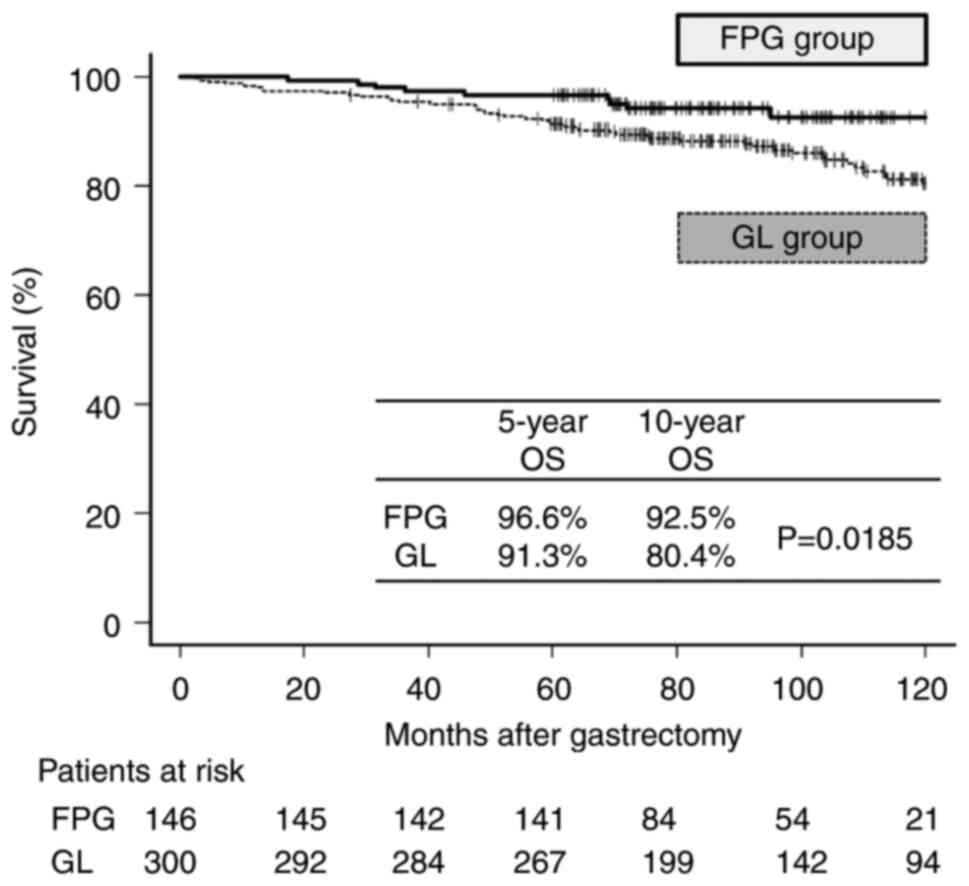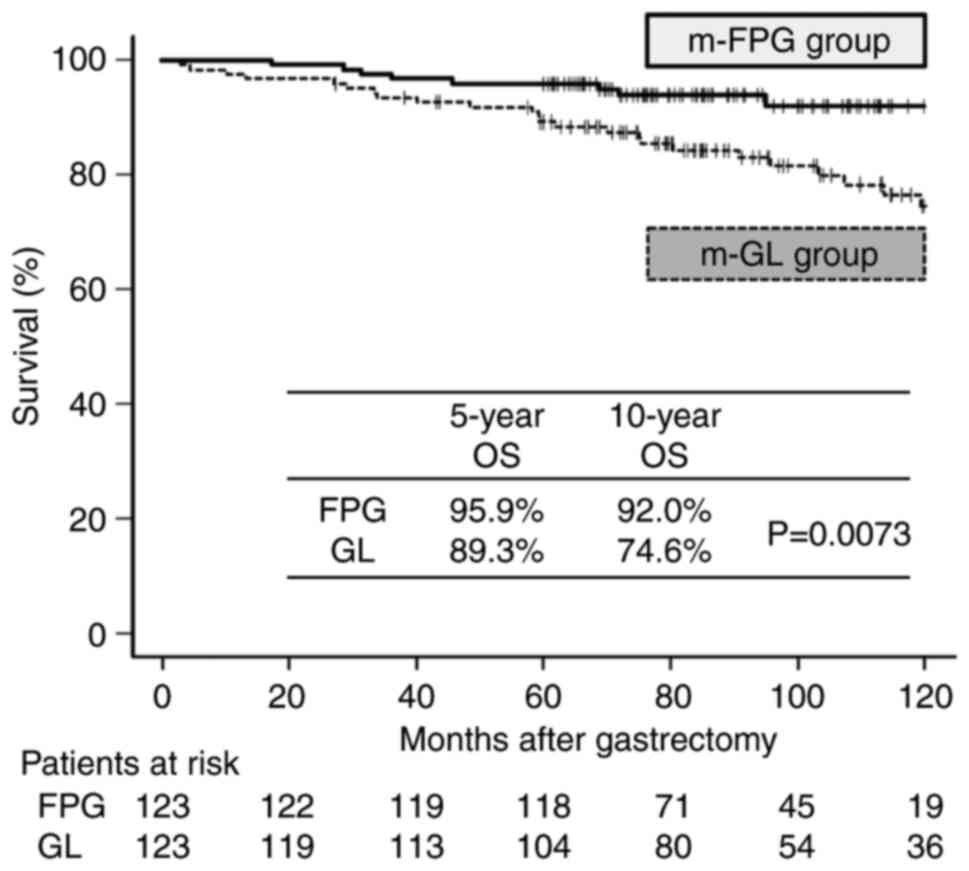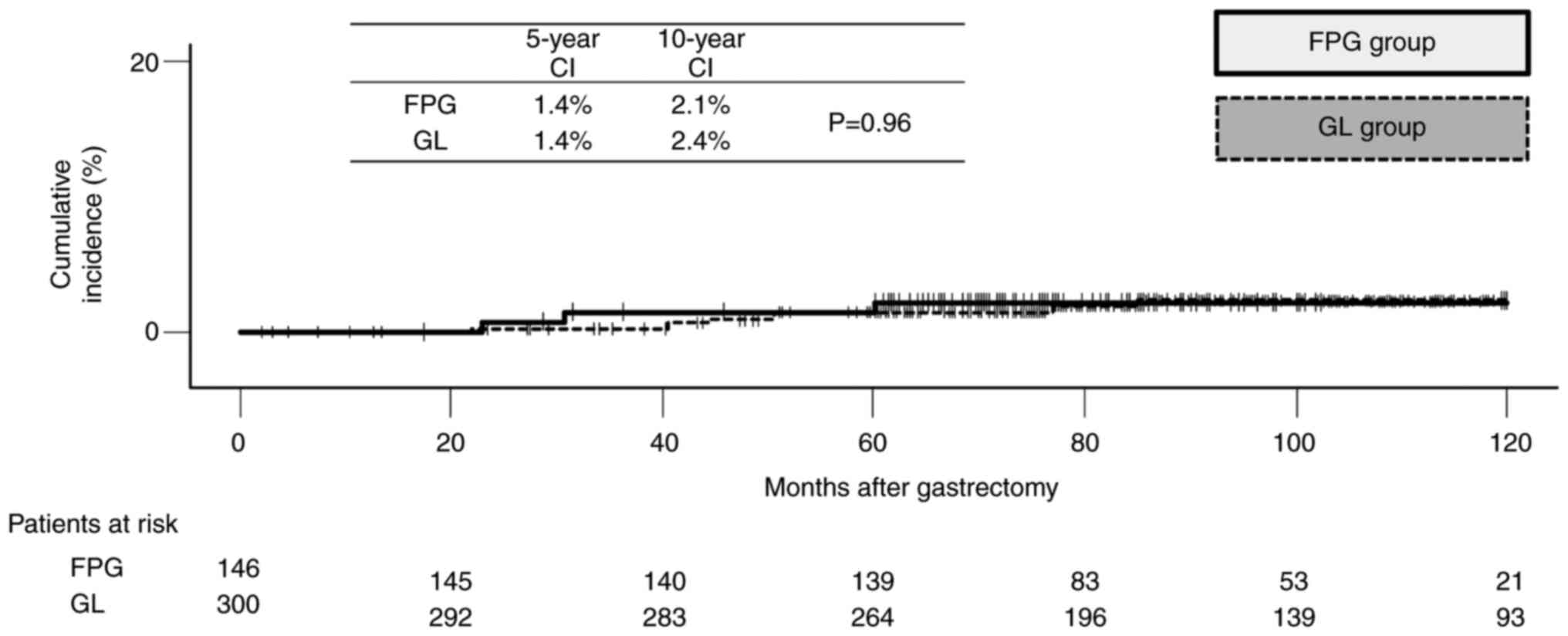|
1
|
Kinami S, Nakamura N, Tomita Y, Miyata T,
Fujita H, Ueda N and Kosaka T: Precision surgical approach with
lymph-node dissection in early gastric cancer. World J
Gastroenterol. 25:1640–1652. 2019. View Article : Google Scholar : PubMed/NCBI
|
|
2
|
Tanaka N, Katai H, Taniguchi H, Saka M,
Morita S, Fukunaga T and Shimoda T: Surgical treatment for early
gastric cancer (Japanese with English abstract). Stomach Intest.
44:700–706. 2009.
|
|
3
|
Japanese Gastric Cancer Association, .
Japanese gastric cancer treatment guidelines 2018 (5th edition).
Gastric Cancer. 24:1–21. 2021. View Article : Google Scholar : PubMed/NCBI
|
|
4
|
Nunobe S, Oda I, Ishikawa T, Akazawa K,
Katai H, Isobe Y, Miyashiro I, Tsujitani S, Ono H, Tanabe S, et al:
Surgical outcomes of elderly patients with stage I gastric cancer
from the nationwide registry of the Japanese gastric cancer
association. Gastric Cancer. 23:328–338. 2020. View Article : Google Scholar : PubMed/NCBI
|
|
5
|
Bolton JS and Conway WC II:
Postgastrectomy syndromes. Surg Clin North Am. 91:1105–1122. 2011.
View Article : Google Scholar : PubMed/NCBI
|
|
6
|
Nakada K, Ikeda M, Takahashi M, Kinami S,
Yoshida M, Uenosono Y, Kawashima Y, Oshio A, Suzukamo Y, Terashima
M and Kodera Y: Characteristics and clinical relevance of
postgastrectomy syndrome assessment scale (PGSAS)-45: Newly
developed integrated questionnaires for assessment of living status
and quality of life in postgastrectomy patients. Gastric Cancer.
18:147–158. 2015. View Article : Google Scholar : PubMed/NCBI
|
|
7
|
Nakada K, Takahashi M, Ikeda M, Kinami S,
Yoshida M, Uenosono Y, Kawashima Y, Nakao S, Oshio A, Suzukamo Y,
et al: Factors affecting the quality of life of patients after
gastrectomy as assessed using the newly developed PGSAS-45 scale: A
nationwide multi-institutional study. World J Gastroenterol.
22:8978–8990. 2016. View Article : Google Scholar : PubMed/NCBI
|
|
8
|
Terashima M, Tanabe K, Yoshida M, Kawahira
H, Inada T, Okabe H, Urushihara T, Kawashima Y, Fukushima N and
Nakata K: Postgastrectomy syndrome assessment scale (PGSAS)-45 and
changes in body weight are useful tools for evaluation of
reconstruction methods following distal gastrectomy. Ann Surg
Oncol. 21 (Suppl 3):S370–S378. 2014. View Article : Google Scholar : PubMed/NCBI
|
|
9
|
Isozaki H, Matsumoto S, Murakami S, Takama
T, Sho T, Ishihara K, Sakai K, Takeda M, Nakada K and Fujiwara T:
Diminished gastric resection preserves better quality of life in
patients with early gastric cancer. Acta Med Okayama. 70:119–130.
2016.PubMed/NCBI
|
|
10
|
Okubo K, Arigami T, Matsushita D, Sasaki
K, Kijima T, Noda M, Uenosono Y, Yanagita S, Ishigami S, Maemura K
and Natsugoe S: Evaluation of postoperative quality of life by
PGSAS-45 following local gastrectomy based on the sentinel lymph
node concept in early gastric cancer. Gastric Cancer. 23:746–753.
2020. View Article : Google Scholar : PubMed/NCBI
|
|
11
|
Seto Y, Yamaguchi H, Shimoyama S, Shimizu
N, Aoki F and Kaminishi M: Results of local resection with regional
lymphadenectomy for early gastric cancer. Am J Surg. 182:498–501.
2001. View Article : Google Scholar : PubMed/NCBI
|
|
12
|
Kim YW, Min JS, Yoon HM, An JY, Eom BW,
Hur H, Lee YJ, Cho GS, Park YK, Jung MR, et al: Laparoscopic
sentinel node navigation surgery for stomach preservation in
patients with early gastric cancer: A randomized clinical trial. J
Clin Oncol. 40:2342–2351. 2022. View Article : Google Scholar : PubMed/NCBI
|
|
13
|
Kinami S, Nakamura N, Miyashita T,
Kitakata H, Fushida S, Fujimura T, Iida Y, Inaki N, Ito T and
Takamura H: Life prognosis of sentinel node navigation surgery for
early-stage gastric cancer: Outcome of lymphatic basin dissection.
World J Gastroenterol. 27:8010–8030. 2021. View Article : Google Scholar : PubMed/NCBI
|
|
14
|
Miwa K, Kinami S, Taniguchi K, Fushida S,
Fujimura T and Nonomura A: Mapping sentinel nodes in patients with
early-stage gastric carcinoma. Br J Surg. 90:178–182. 2003.
View Article : Google Scholar : PubMed/NCBI
|
|
15
|
Kinami S, Oonishi T, Fujita J, Tomita Y,
Funaki H, Fujita H, Nakano Y, Ueda N and Kosaka T: Optimal settings
and accuracy of indocyanine green fluorescence imaging for sentinel
node biopsy in early gastric cancer. Oncol Lett. 11:4055–4062.
2016. View Article : Google Scholar : PubMed/NCBI
|
|
16
|
American Society of Anesthesiologists. ASA
physical status classification system. Available at, . https://www.asahq.org/standards-and-practice-parameters/statement-on-asa-physical-status-classification-systemDecember
12–2020
|
|
17
|
Cancer Therapy Evaluation Program, .
Common Toxicity Criteria (CTC) Version 2.0. 1999.
|
|
18
|
Japanese Gastric Cancer Association, .
Japanese classification of gastric carcinoma 2017. 15th edition.
Kanehara-shuppan; Tokyo: 2018
|
|
19
|
Japanese Association of Medical
Technologists, . 5.1 Hematoxylin-eosin staining. Textbook of
pathology techniques. 4th edition. Maruzen-publishing Co. Ltd.;
Tokyo: pp. pp118–123. 2021, (In Japanese).
|
|
20
|
Kanda Y: Investigation of the freely
available easy-to-use software ‘EZR’ for medical statistics. Bone
Marrow Transplant. 48:452–458. 2013. View Article : Google Scholar : PubMed/NCBI
|
|
21
|
Kitagawa Y, Takeuchi H, Takagi Y, Natsugoe
S, Terashima M, Murakami N, Fujimura T, Tsujimoto H, Hayashi H,
Yoshimizu N, et al: Sentinel node mapping for gastric cancer: A
prospective multicenter trial in Japan. J Clin Oncol. 31:3704–3710.
2013. View Article : Google Scholar : PubMed/NCBI
|
|
22
|
Kamiya S, Takeuchi H, Fukuda K, Kawakubo
H, Takahashi N, Mitsumori N, Terashima M, Tsujimoto H, Kinami S,
Natsugoe S, et al: A multicenter non-randomized phase III study of
sentinel node navigation surgery for early gastric cancer. Jpn J
Clin Oncol. 51:305–309. 2021. View Article : Google Scholar : PubMed/NCBI
|
|
23
|
Kinami S, Aizawa M, Yamashita H, Kumagai
K, Kamiya S, Toda M, Takahata T, Fujisaki M, Miyamoto H, Kusanagi
H, et al: The incidences of metachronous multiple gastric cancer
after various types of gastrectomy: Analysis of data from a
nationwide Japanese survey. Gastric Cancer. 24:22–30. 2021.
View Article : Google Scholar : PubMed/NCBI
|
|
24
|
Nunobe S, Sasako M, Saka M, Fukagawa T,
Katai H and Sano T: Symptom evaluation of long-term postoperative
outcomes after pylorus-preserving gastrectomy for early gastric
cancer. Gastric Cancer. 10:167–172. 2007. View Article : Google Scholar : PubMed/NCBI
|
|
25
|
Morita S, Katai H, Saka M, Fukagawa T,
Sano T and Sasako M: Outcome of pylorus-preserving gastrectomy for
early gastric cancer. Br J Surg. 95:1131–1135. 2008. View Article : Google Scholar : PubMed/NCBI
|
|
26
|
Ohwada S, Nakamura S, Ogawa T, Izumi M,
Tanahashi Y, Sato Y, Ikeya T, Iino Y and Morishita Y: Segmental
gastrectomy for early cancer in the mid-stomach.
Hepatogastroenterology. 46:1229–1233. 1999.PubMed/NCBI
|
|
27
|
Matsuda T, Kaneda K, Takamatsu M, Aishin
K, Awazu M, Okamoto A and Kawaguchi K: Segmental gastrectomy with
radical lymph node dissection for early gastric cancer. World J
Gastroenterol. 16:5247–5251. 2010. View Article : Google Scholar : PubMed/NCBI
|
|
28
|
Fujimura T, Fushida S, Kayahara M, Ohta T,
Kinami S and Miwa K: Transectional gastrectomy: An old but renewed
concept for early gastric cancer. Surg Today. 40:398–403. 2010.
View Article : Google Scholar : PubMed/NCBI
|
|
29
|
Nomura E and Okajima K:
Function-preserving gastrectomy for gastric cancer in Japan. World
J Gastroenterol. 22:5888–5895. 2016. View Article : Google Scholar : PubMed/NCBI
|
|
30
|
Kinami S, Fujimura T, Fushida S, Miyashita
T, Ninomiya I, Fujita H, Nishimura G, Kayahara M and Ohta T: The
pitfalls and measures for pylorus preserving procedure in the
limited surgery for early gastric cancer (Japanese). Surg Therary.
96:1067–1074. 2007.
|
|
31
|
Nunobe S, Hiki N, Gotoda T, Murao T,
Haruma K, Matsumoto H, Hirai T, Tanimura S, Sano T and Yamaguchi T:
Successful application of laparoscopic and endoscopic cooperative
surgery (LECS) for a lateral-spreading mucosal gastric cancer.
Gastric Cancer. 15:338–342. 2012. View Article : Google Scholar : PubMed/NCBI
|
|
32
|
Inoue H, Ikeda H, Hosoya T, Yoshida A,
Onimaru M, Suzuki M and Kudo S: Endoscopic mucosal resection,
endoscopic submucosal dissection, and beyond: Full-layer resection
for gastric cancer with nonexposure technique (Clean-Net). Surg
Oncol Clin N Am. 21:129–140. 2012. View Article : Google Scholar : PubMed/NCBI
|
|
33
|
Goto O, Takeuchi H, Kawakubo H, Sasaki M,
Matsuda T, Matsuda S, Kigasawa Y, Kadota Y, Fujimoto A, Ochiai Y,
et al: First case of non-exposed endoscopic wall-inversion surgery
with sentinel node basin dissection for early gastric cancer.
Gastric Cancer. 18:434–439. 2015. View Article : Google Scholar : PubMed/NCBI
|
|
34
|
Kikuchi S, Nishizaki M, Kuroda S, Tanabe
S, Noma K, Kagawa S, Shirakawa Y, Kato H, Okada H and Fujiwara T:
Nonexposure laparoscopic and endoscopic cooperative surgery (closed
laparoscopic and endoscopic cooperative surgery) for gastric
submucosal tumor. Gastric Cancer. 20:553–557. 2017. View Article : Google Scholar : PubMed/NCBI
|
|
35
|
Kitakata H, Itoh T, Kinami S, Kawaura K,
Hamada K, Azukisawa S, Kobayashi R, Kamai J and Kosaka T: Sealed
endoscopic full-thickness resection for gastric cancer: A pilot
study in an ex vivo and in vivo porcine model. Endosc Int Open.
7:E36–E42. 2019. View Article : Google Scholar : PubMed/NCBI
|
|
36
|
Cooperman AM: Postoperative alkaline
reflux gastritis. Surg Clin North Am. 56:1445–1459. 1976.
View Article : Google Scholar : PubMed/NCBI
|
|
37
|
Nakada K, Kawashima Y, Kinami S, Fukushima
R, Yabusaki H, Seshimo A, Hiki N, Koeda K, Kano M, Uenosono Y, et
al: Comparison of effects of six main gastrectomy procedures on
patients' quality of life assessed by postgastrectomy syndrome
assessment scale-45. World J Gastrointest Surg. 13:461–475. 2021.
View Article : Google Scholar : PubMed/NCBI
|
|
38
|
Fujita J, Takahashi M, Urushihara T,
Tanabe K, Kodera Y, Yumiba T, Matsumoto H, Takagane A, Kunisaki C
and Nakada K: Assessment of postoperative quality of life following
pylorus-preserving gastrectomy and Billroth-I distal gastrectomy in
gastric cancer patients: Results of the nationwide postgastrectomy
syndrome assessment study. Gastric Cancer. 19:302–311. 2016.
View Article : Google Scholar : PubMed/NCBI
|
|
39
|
Kiyokawa T, Hiki N, Nunobe S, Honda M,
Ohashi M and Sano T: Preserving infrapyloric vein reduces
postoperative gastric stasis after laparoscopic pylorus-preserving
gastrectomy. Langenbecks Arch Surg. 402:49–56. 2017. View Article : Google Scholar : PubMed/NCBI
|
|
40
|
Nishizawa N, Hosoda K, Moriya H, Mieno H,
Ema A, Ushiku H, Ishii S, Tanaka T, Washio M, Yokoi K, et al:
Patients' preoperative background causes gastric stasis after
laparoscopy-assisted pylorus-preserving gastrectomy. Asian J Endosc
Surg. 11:337–345. 2018. View Article : Google Scholar : PubMed/NCBI
|
|
41
|
Kaji S, Makuuchi R, Irino T, Tanizawa Y,
Bando E, Kawamura T, Omori H, Fujiya K, Nishiwaki N, Furukawa K, et
al: Preventive effect on delayed gastric emptying of preserving the
infra-pyloric vein in laparoscopic pylorus-preserving gastrectomy
for early gastric cancer. Surg Endosc. 34:3853–3860. 2020.
View Article : Google Scholar : PubMed/NCBI
|




















